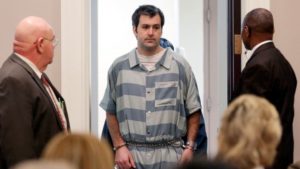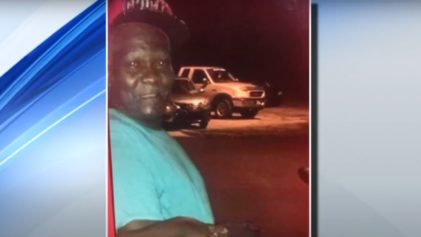
Former South Carolina police officer Michael Slager. Photo by Grace Beahm/AP
Jury selection in the case of an ex-South Carolina police officer accused of fatally shooting an unarmed Black man is set to begin Monday in Charleston.
Ex-cop Michael Slager, 34, is accused of shooting and killing Walter Scott following a traffic stop back in April 2015. The lethal encounter was captured on cell phone video.
Slager stopped the 50-year-old man for a busted tail light on his Mercedes Benz, after which he approached the driver’s side window to ask Scott for his driver’s license and other papers for the car, the police dash cam video showed. As the officer returned to his cruiser, Scott fled from his vehicle.
Bystander video captured the intense moments afterward as Slager gave chase, eventually catching up to Scott in an abandoned lot. That’s when the officer fired several shots at the unarmed man as he ran away.
According to NPR, Slager told authorities Scott had his taser, but the bystander video told a different story. Once the footage was made public, Slager was fired and charged with Scott’s murder. He was indicted by a grand jury June 8, NBC News reports.
Slager’s lawyer, Andy Savage, said he plans to argue his client was simply following police protocol.
“The whole focus of our case really is in a matter of nanoseconds,” Savage told NPR. “What was in Slager’s mind at the instant that he decided to use lethal force?”
For many in Charleston, the fact that Slager was even charged and indicted in Scott’s murder is a major step toward justice. In similar police killings involving Black victims, the accused officers rarely, if ever, face criminal charges.
“On the one hand, you’ve got two very cut-and-dry things that happened,” Rev. Joseph A. Darby, presiding elder for the Beaufort District of the African Methodist Episcopal Church, said of the Slager trial and upcoming court proceedings of Charleston church shooter Dylann Roof. “There should be very little question of how these trials are going to come out. Then you look at Eric Garner. You look at Tamir Rice. You look at George Zimmerman and Trayvon Martin.”
“Guilty verdicts will mean that justice will be done,” Darby continued. “I don’t minimize the impact of a white police officer being found guilty for killing a Black man, but it doesn’t mean that’s suddenly going to happen in all cases.”
Rev. Thomas Ravenell from Empowerment Missionary Baptist Church in North Charleston expressed the same skepticism.
“We’ve seen what happened in Baltimore,” Ravenell said. “Nobody killed Freddie Gray. So the folks in Charleston, we want to see [Slager] go to jail and send a message to other officers that if you do, it’s a harsh penalty to pay. Anything else less than that, I think the people in the city will be very upset.”
According to Atlanta Black Star, the city of North Charleston agreed to pay Scott’s family $6.5 million for their loved one’s death, the largest settlement in state history. The agreement, reached in October of last year, would settle all claims the slain man’s family had against the state.
Muhiyidin d’Baha, an organizer with Black Lives Matter Charleston, said he hopes the Slager trial will be a turning point in cases of police shootings where a Black man’s word is often pitted against those of a white cop.
“This case can get us over that hump,” d’Baha told NPR. “In the courts, we can finally have our voice be validated. So we can have a little bit of faith within using the court system to get justice and equal things out.”
If convicted, Slager faces life behind bars.


